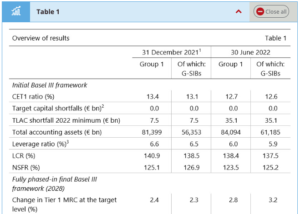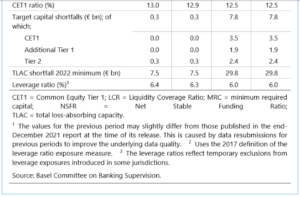Basel III capital ratios for a sample of the largest global banks decreased from their record highs in H2 2021 to pre-pandemic levels in H1 2022, according to the latest Basel III monitoring exercise, based on 30 June 2022 data, published on 28 February. The leverage ratio fell on average across all regions, after showing some volatility during the pandemic period. The dividend payout ratio continued its upward trend as banks no longer face restrictions in dividends that member jurisdictions introduced at the onset of the pandemic. The report sets out the impact of the Basel III framework, including the December 2017 finalisation of the Basel III reforms and the January 2019 finalisation of the market risk framework. It covers both Group 1 and Group 2 banks (see note to editors for definitions).
The implementation of the final Basel III minimum requirements began on 1 January 2023. For this reporting period, the average impact of the fully phased-in final Basel III framework on the Tier 1 minimum required capital (MRC) of Group 1 banks is +2.8%, compared with +2.4% at end-December 2021. Group 1 banks reported total regulatory capital shortfalls amounting to €7.8 billion, compared with a shortfall of €0.3 billion at end-December 2021, due to an improvement in data reporting quality.
The monitoring exercises also collect bank data on Basel III liquidity requirements. The weighted average Liquidity Coverage Ratio (LCR) decreased from the prior reporting period to 138.4% for Group 1 banks. For this reporting period, three Group 1 banks reported an LCR below the minimum requirement of 100% as they used the flexibility embedded in the Basel framework to use their stock of high-quality liquid assets (HQLA) during the pandemic period.
The weighted average Net Stable Funding Ratio (NSFR) decreased to 123.5% for Group 1 banks. As of June 2022, all banks in the NSFR sample reported a ratio that met or exceeded the minimum requirement of 100%.


The report includes a special feature on the regional distribution of Group 1 and Group 2 banks and their impact on results in the Basel III monitoring reports. The special feature focuses on the difference in sample sizes between the end-June and end-December data. It also explores the effect of the different regional representation of banks on RWA and minimum required capital and compares it to the overall results presented in the report.
The report is accompanied by interactive Tableau dashboards that allow users to explore the results with greater ease and flexibility. In addition to dashboards published previously, there are now additional dashboards on securitisation and cryptoasset exposures, as well as a dashboard on the impact of the final Basel III framework. Similar dashboards related to other sections of the report may be added at a later stage.
Source: BIS






